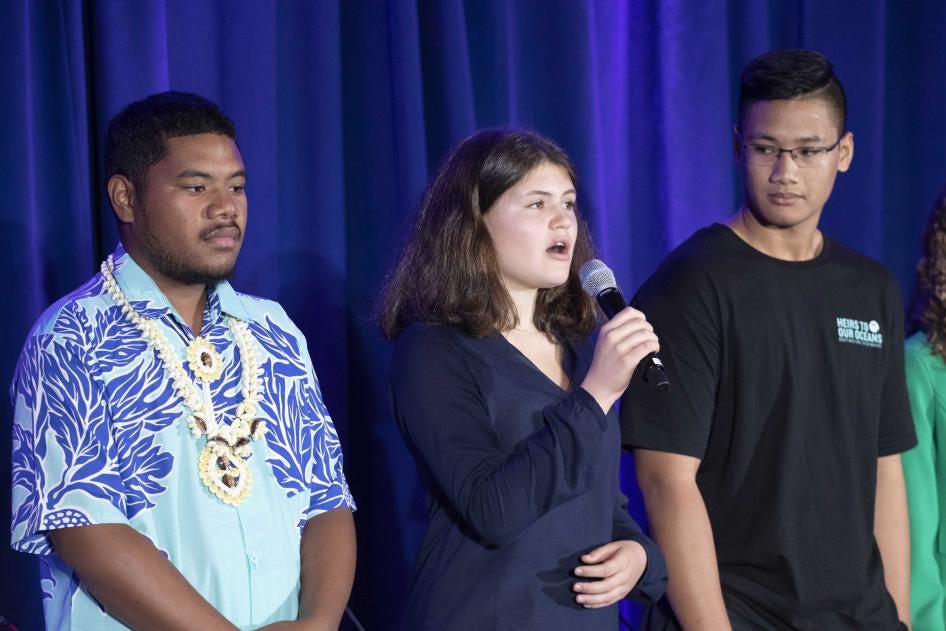When the UN Committee on the Rights of the Child decided in October it could not move forward with a climate crisis petition, I received a message from Raina Ivanova, one of the 16 youth who had brought the case. “We are all very disappointed,” she said. “I feel extremely left alone by the Committee on the Rights of the Child [the] UN body who is supposed to help uphold our rights.”
She is not the only one who is disappointed that the Committee did not proceed with a deeper examination of governments’ lagging efforts to fight the global climate crisis. Her co-plaintiff from the United States, Alexandria Villaseñor, says it is moments like these that drive children to get involved in the fight for a better future: “That’s why at the COP there’s going to be so many children … because a lot of us are angry.”
Sixteen children from all continents—including Greta Thunberg—had brought the case to the UN Committee on the Rights of the Child in September 2019, arguing that climate change is already affecting children all over the world, and governments are falling short on decisive and ambitious action to stop it. The UN Committee on the Rights of the Child is the UN body tasked with monitoring how governments fulfil their treaty obligations to protect child rights.
The youth activists’ complaint accused five countries—Argentina, Brazil, France, Germany, and Turkey—of failing to prevent foreseeable human rights harm caused by climate change, and thus placing the burden and cost of climate change on children and future generations. The five countries are the top greenhouse gas emitters among the 48 countries that have accepted the UN Committee’s jurisdiction to hear individual child rights complaints against them.
The Committee ruled it could not proceed with the case on October 11 on procedural grounds, because the plaintiffs had failed to go to national courts before approaching the UN. A lawyer for the plaintiffs announced that “the legal battle for the climate now returns to national courts.”
Despite this disappointment, the silver lining is actually pretty bright. The Child Rights Committee accepted many of the legal arguments that the children had made to establish the governments’ responsibility for the impacts of the climate crisis on children’s rights. Most notably, the Committee affirmed, in the face of unanimous arguments to the contrary by the governments, that states have obligations to prevent foreseeable harm beyond their own borders that results from climate change activities and omissions on their territory. In ruling that the children had standing as victims of rights violations, the Committee confirmed that the climate crisis is a child rights crisis.
This may sound more obvious and evident than it is. In international law, states’ climate change-related human rights obligations beyond their own border have long been disputed. For example, France argued that it does not have extra-territorial jurisdiction over the case because climate change is a complex phenomenon characterized by an entanglement of causes and a multiplicity of actors, making direct attribution of the impacts to one specific government impossible.
The Committee’s ruling firmly rejects that notion and makes clear that the collective nature of climate change causation does not absolve individual governments of their individual obligations. It also found that there was a sufficient and foreseeable causal link between the harm alleged by the children and the acts of the five governments. This will be fundamental for others who are taking their governments to court over the climate crisis.
The activists will not be deterred by this stumble at the first hurdle. On the contrary they want to see real action now, at the COP26 climate negotiations in Glasgow. Inside and outside the conference room, they are saying loud and clear that governments must decide now to make rapid emission cuts, that there is no time to lose.
Their views are well expressed by Ayakha Melithafa, the South African plaintiff in the UN climate case, whose reaction to the Committee’s rejection was to say: “I am disappointed with the Committee’s decision today, but also more determined than ever to use every platform available to me to keep fighting for my future.”









